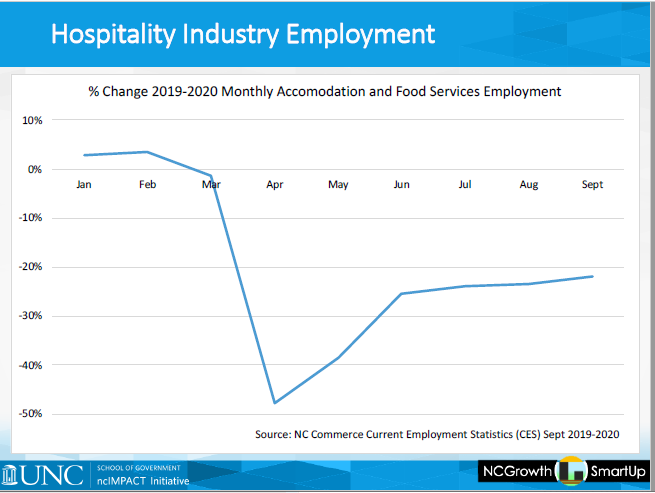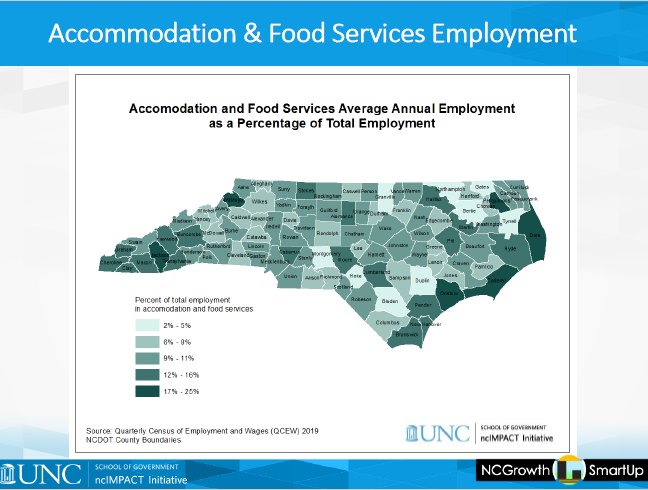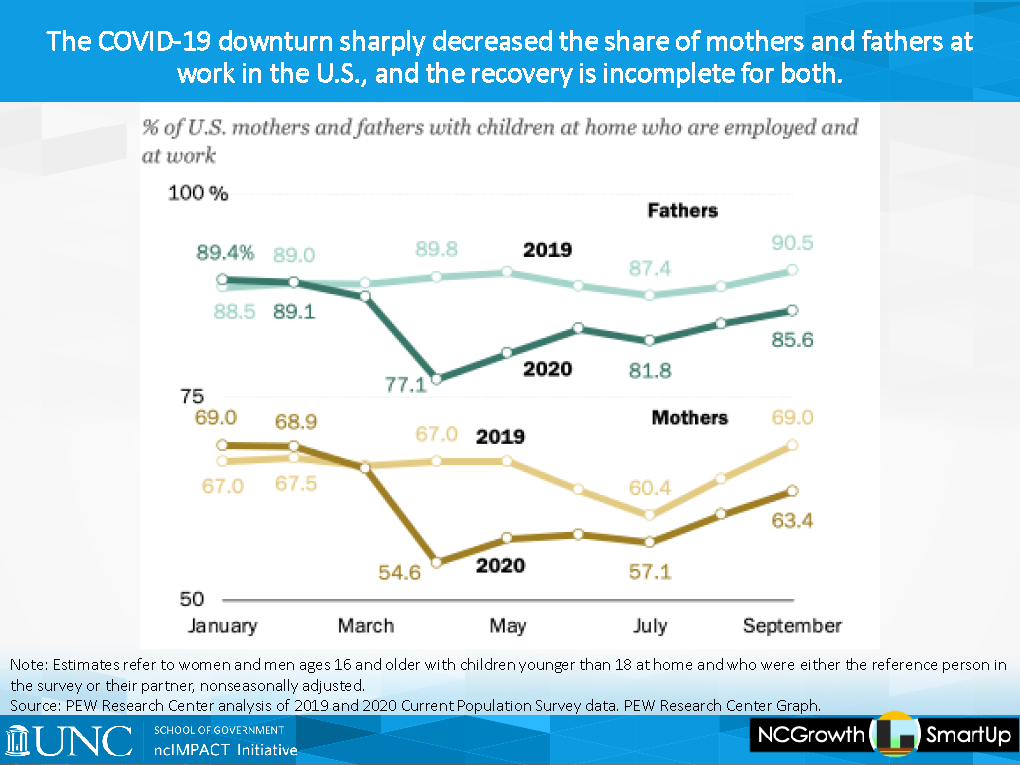Collaboration in the Face of Crisis: The Keys to Economic Recovery from COVID-19
The project team outlined two major, interconnected issues facing communities during the COVID-19 pandemic: hospitality employment and parents departing the workforce. The hospitality industry is one of the hardest hit industries given business closures, reduced capacity, and low consumer confidence. Hospitality employment plummeted in April 2020 and has yet to recover. In North Carolina, September 2020 sector employment was still about 20% lower than September 2019. Underlying this issue is the struggle to reopen businesses safely and improve consumer confidence.

The ncIMPACT Initiative at the UNC School of Government and NCGrowth at the Kenan Institute for Private Enterprise partnered to identify and communicate strategies communities can leverage to help local economies recover from the COVID-19 pandemic. The project includes a series of four webinars. The third webinar, held on November 18, 2020, was centered around collaboration, and highlighted several statewide programs that local leaders can implement in their communities.
Keynote speaker Brian Elms, Innovation Practice Lead at the Change & Innovation Agency and author of Peak Performance, provided insight into establishing lasting collaborations. He highlighted the positive nature of collaborations, reframing the “give-take” idea into a “give-give” perspective that focuses on what each collaborator can offer the other and the resulting benefits. He also emphasized including team members in collaborations throughout the process to ensure initial buy-in and lasting involvement throughout the organizations. Anita Brown-Graham added that the idea of “give-give” seems difficult but reflects the increased collaboration local governments report as they respond to COVID-19.
The project team outlined two major, interconnected issues facing communities during the COVID-19 pandemic: hospitality employment and parents departing the workforce.
HOSPITALITY
The hospitality industry is one of the hardest hit industries given business closures, reduced capacity, and low consumer confidence. Hospitality employment plummeted in April 2020 and has yet to recover. In North Carolina, September 2020 sector employment was still about 20% lower than September 2019. Underlying this issue is the struggle to reopen businesses safely and improve consumer confidence.
Lynn Minges, President & CEO of the NC Restaurant and Lodging Association (NCRLA), spoke about the statewide collaboration Count on Me NC, which is a collaboration between the NC Restaurant and Lodging Association, VisitNC, NC State Extension, and the North Carolina Department of Health and Human Services. The collaboration is a combination of public health information and COVID-19 health and safety information for businesses to help them reopen to reduce risk to employees and customers. The website also highlights participating businesses to help improve consumer confidence and drive customers to safe businesses.
The PEW Research Center reported that the share of mothers and fathers in the workforce in 2020 declined significantly from 2019. Both mothers and fathers experience an incomplete recovery, meaning that many parents who left the workforce to care for children have not returned. Turnover can cost companies 10 to 20% of the employee’s salary to train a replacement. In NC metro areas, the share of workers that are childcare-dependent working parents ranges from 16% to 25%. The lack of childcare and in-person schooling may result in a disproportionate impact on the workforce of these areas.
PARENTS DEPARTING THE WORKFORCE
Family Forward NC is an initiative of the North Carolina Early Childhood Foundation (NCECF) that collaborates with businesses and local governments across the state to create a community of family-friendly workplaces. Lisa Finaldi, Community Engagement Leader from the NC Early Childhood Foundation (NCEF), and Christopher Chung, CEO of the Economic Development Partnership of North Carolina (EDPNC), presented Family Forward NC, explaining how family friendly policies in the workplace can reduce turnover, but also attract employees. In response to COVID-19, Family Forward NC established a COVID-19 Rapid Response Program, which provides employers with free access to human resources assistance in reopening their workplaces and establishing quality family-friendly practices that will continue to benefit companies and their employees even after recovery.
During the peer learning session following this webinar, attendees inquired about the role of local tourism authorities and other groups in promoting Count on Me NC. Attendees were also curious about the level of consumer interest in the program and how it can be used to market the program to businesses. Minges explained that VisitNC conducts customer surveys frequently to support their work, and the significant amount of consumer concern was actually the impetus for Count on Me NC. Attendees also asked whether many companies were implementing temporary paid leave policies for COVID-19 quarantining and recovery even if they cannot afford a full paid leave policy. Finaldi explained that in sectors where employees’ presence is required, such as manufacturing and tourism, there is a mix of policies, but some companies are able to support employees through CARES Act funding.
Learn more about project findings and resources at https://go.unc.edu/KeystoRecovery.
This project was supported by the North Carolina Policy Collaboratory at the University of North Carolina at Chapel Hill with funding from the North Carolina Coronavirus Relief Fund established and appropriated by the North Carolina General Assembly.



